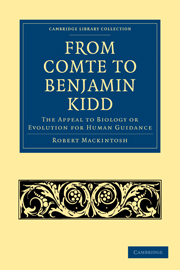Book contents
- Frontmatter
- PREFACE
- Contents
- CHAPTER I INTRODUCTORY
- PART I COMTISM, WITH SOME SCATTERED PARALLELS
- PART II SIMPLE EVOLUTIONISM—SPENCER, STEPHEN
- PART III DARWINISM, OR STRUGGLE FOR EXISTENCE
- CHAPTER XI “DARWINISM IN MORALS”—MISS COBBE'S PROTEST
- CHAPTER XII DARWINISM IN POLITICS—BAGEHOT
- CHAPTER XIII DARWINISM IN ETHICS—PROFESSOR ALEXANDER
- CHAPTER XIV REACTION FROM DARWINISM—HUXLEY
- CHAPTER XV REACTION FROM DARWINISM—DRUMMOND's “ASCENT OF MAN”
- CHAPTER XVI REITERATION OF DARWINISM: ELIMINATION MADE ABSOLUTE—MR. A. SUTHERLAND
- CHAPTER XVII THE METAPHYSICS OF NATURAL SELECTION
- PART IV HYPER-DARWINISM—WEISMANN, KIDD
- Index
CHAPTER XII - DARWINISM IN POLITICS—BAGEHOT
Published online by Cambridge University Press: 29 August 2010
- Frontmatter
- PREFACE
- Contents
- CHAPTER I INTRODUCTORY
- PART I COMTISM, WITH SOME SCATTERED PARALLELS
- PART II SIMPLE EVOLUTIONISM—SPENCER, STEPHEN
- PART III DARWINISM, OR STRUGGLE FOR EXISTENCE
- CHAPTER XI “DARWINISM IN MORALS”—MISS COBBE'S PROTEST
- CHAPTER XII DARWINISM IN POLITICS—BAGEHOT
- CHAPTER XIII DARWINISM IN ETHICS—PROFESSOR ALEXANDER
- CHAPTER XIV REACTION FROM DARWINISM—HUXLEY
- CHAPTER XV REACTION FROM DARWINISM—DRUMMOND's “ASCENT OF MAN”
- CHAPTER XVI REITERATION OF DARWINISM: ELIMINATION MADE ABSOLUTE—MR. A. SUTHERLAND
- CHAPTER XVII THE METAPHYSICS OF NATURAL SELECTION
- PART IV HYPER-DARWINISM—WEISMANN, KIDD
- Index
Summary
The next important application of Darwinian notions to social questions is found in Walter Bagehot's Physics and Politics,—a little book full of interest on every page, and still alive with suggestions after twenty-five years. It is or seeks to be truly Darwinian, dealing, as the titlepage tells us, with “inheritance” and “natural selection,” and trying to “apply them to political society.”
The author is profoundly impressed, first of all, with the transforming power which science attributes to evolutionary change. Things become absolutely different from what they were. Nay more ; this is true not merely of some things but of all. Everything is in motion. And therefore everything has become, in the light of modern science, “an antiquity.”
Speaking more strictly of human or social evolution, Mr. Bagehot makes a very strong statement of the part presumably played by nerve tissue in rendering such evolution possible. No one, he thinks, will be able to understand evolution in history, if he has not this material basis of evolution before his eyes. In other words, we have here an act of adherence to Spencer's position—to Spencer's even more than Darwin's — against attacks such as have more recently been made by Weismann. For we have here not merely an assertion of the inheritance of acquired qualities, but an assertion of the physical inheritance of the results of mental processes.
- Type
- Chapter
- Information
- From Comte to Benjamin KiddThe Appeal to Biology or Evolution for Human Guidance, pp. 115 - 123Publisher: Cambridge University PressPrint publication year: 2009First published in: 1899



